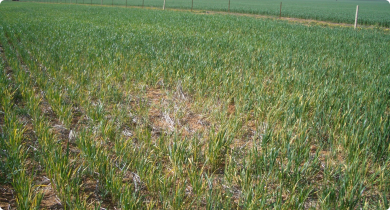Viruses & virus-like
There are many types of viruses, viroids, prions and syndromes that have the potential to affect animal and plant health in Western Australia. Viruses pose a serious risk for primary producers, as they can impact on market access and agricultural production.
Western Australia is free from some of the world's major agricultural and livestock diseases. Good biosecurity measures on your property are vital for preventing the spread of animal and plant diseases. Viruses can be spread by insect vectors. There are no pesticides that can be used to kill viruses, however they can be reduced and controlled by controlling these insect vectors with pesticides.
The Department of Primary Industries and Regional Development provides:
- biosecurity/quarantine measures at the WA border to prevent the entry of plant and animal diseases.
- post border biosecurity measures for harmful animal and plant diseases.
- advice on widespread diseases present in the state.
For advice on animal and plant diseases search our website, the Western Australian Organism List or contact our Pest and Disease Information Service (PaDIS).
For diagnostic services, please contact our Diagnostic Laboratory Services.
Articles
Filter by search
Filter by topic
- Lupins (1) Apply Lupins filter
- Grains (1) Apply Grains filter
- Fungi (1) Apply Fungi filter
- Mechanical, physical and cultural (1) Apply Mechanical, physical and cultural filter
- Nematodes (1) Apply Nematodes filter
- Pulses (1) Apply Pulses filter
- Pests (1) Apply Pests filter
- Oats (1) Apply Oats filter
- Crops (1) Apply Crops filter
- Crop diseases (1) Apply Crop diseases filter
- Bacteria (1) Apply Bacteria filter
- (-) Remove Wheat filter Wheat
- (-) Remove Fungicides filter Fungicides
- Barley (1) Apply Barley filter
- Canola (1) Apply Canola filter
- Control methods (1) Apply Control methods filter
- Chemicals (1) Apply Chemicals filter
- (-) Remove Grains research & development filter Grains research & development


